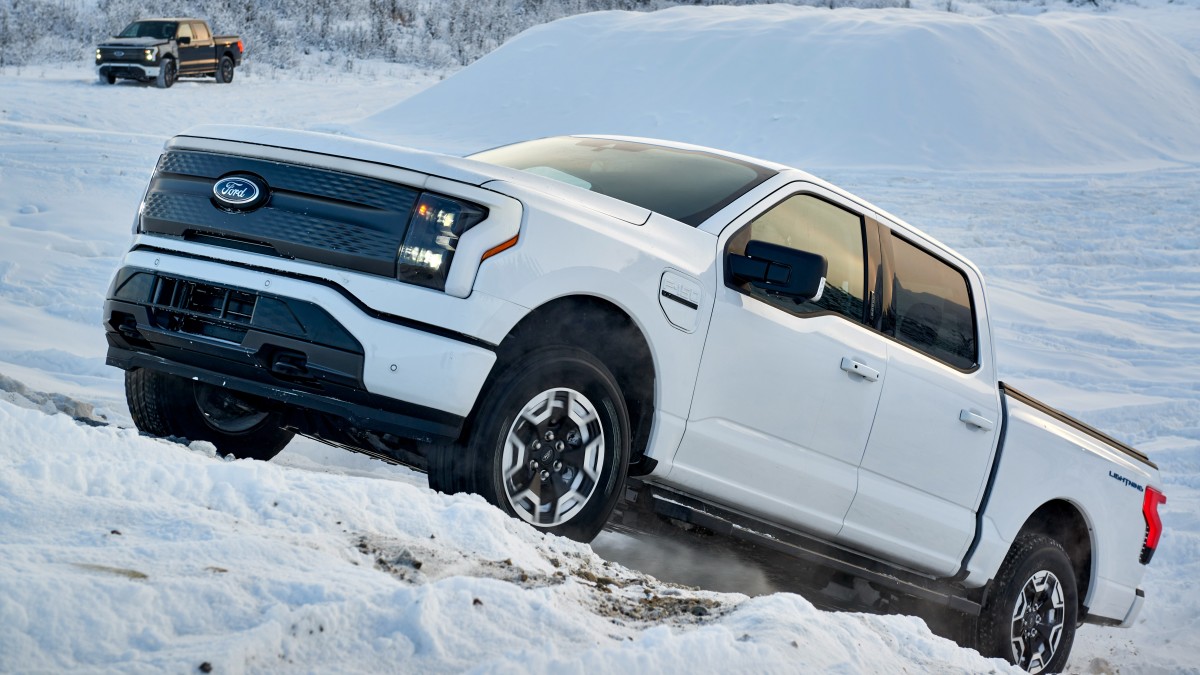
Ford (F) CEO Jim Farley is known for some pretty radical ideas, but a recent statement could be his most flagrant when it comes to potentially angering American car buyers.
During an appearance at the Aspen Ideas Festival, the Blue Oval figurehead stated that for companies like his to get ahead with EV adoption, Americans must make a change that may seem un-American.
“We have to start to get back in love with smaller vehicles. It’s super important for our society and for EV adoption, Farley said.
Related: Ford CEO says American car buyers need to break this addiction
"We are just in love with these monster vehicles, and I love them too, but it’s a major issue with weight."
Farley doubled down on his past statements during Ford's second-quarter earnings call on July 24, and explained why a smaller car might make sense for American buyers.

Ford
Bigger isn't always better, says Farley.
The stock took a big dive after the earnings call and was flat on Friday. The July 26 decline was so big, the shares are now down on the year.
It may be hard to picture a company like Ford Motor Co. (F) , whose identity is rooted in big SUVs and Trucks like the Explorer and F-150, promoting smaller cars.
Farley explained that over the past 120 years, Ford has found that "the bigger the vehicle, the higher the margin." The Blue Oval knows it can sell big SUVs and pickup trucks for higher prices and rake in profits, but it has also found out that that business model does not work for EVs.
The most expensive part of EVs is the batteries, and to achieve the 300+ mile range in the package that American buyers want, automakers need to stuff bigger and more expensive batteries in their vehicles.
“[The math is] exactly the opposite for EVs,” he said during the earnings call. “The larger the vehicle, the bigger the battery, the more pressure on margins because customers will not pay a premium for those larger batteries.”
Farley also emphasized that small batteries have "an outsized impact on the cost and margin" of EVs, which can keep vehicle costs low. The CEO said that the company is "focusing on very differentiated vehicles" with price targets as low as $30,000, which can be made much lower with the IRA tax credit.
More Business of EVs:
- Porsche and Mercedes diverge at EV crossroads
- A Fisker-type problem is affecting an automaker known for quality
- Police officer pulls over Waymo robotaxi, is greeted by no driver or passengers
Ford CEO addresses the small car criticism
During the call, Farley took some time to address some misconceptions that have arisen about Ford's "small cars."
The CEO shot down the idea that Ford would build Americans tiny cars with cramped interiors. Alternatively, he explained that the benefits of EVs include the ability to make even the smallest cars feel comfortable.
"With no engine or drivetrain, a smaller vehicle can have a much roomier package, actually the interior package of a class above with a small silhouette. That's a big advantage for customers versus ICE," Farley said.
But despite what Farley has in store for the future of electric vehicles, data shows that Americans have some pretty big appetites that are not just limited to KFC or Del Taco.
According to recent data from Kelly Blue Book published on July 17, eight out of the ten best-selling cars so far in 2024 were pickup trucks and SUVs. The two lone "normal-sized" outliers were the compact Honda Civic at number ten and the mid-size Toyota Camry at number seven.
In 2023, the Camry was the lone outlier, and in 2021, it accompanied the Civic in a lineup of SUVs and pickups in the top 10.
Related: Rivian CEO blames a Tesla product for the EV slowdown
Ford's big EV hurdle
Despite the excitement towards smaller cars, bigger EVs will have a future at the Blue Oval.
Farley stated that it will have to be "really careful” and “make much smarter choices" when it comes to producing certain vehicles.
In a recent announcement, Ford said that it is investing $2.3 billion to redo its Oakville Assembly Complex in Oakville, Ontario, Canada, to expand production of its gas-guzzling Super Duty pickup truck. The plant was originally designated to house the assembly of Ford's now-delayed three-row electric SUV, which is now scheduled to be released in 2027.
The Blue Oval said that during the second quarter of 2024, its EV business lost $1.1 billion as it works to increase production value and achieve meaningful economies of scale.
Ford, which trades on the New York Stock Exchange, fell 18.4% to $11.16 on July 25. It was up 3 cents to 11.19 on July 26.
The shares fell 20% on the week and are off nearly 25% from their 52-week high of $14.85, reached on July 19. For the year to date, the shares are off 8.2%.
Related: Veteran fund manager picks favorite stocks for 2024







